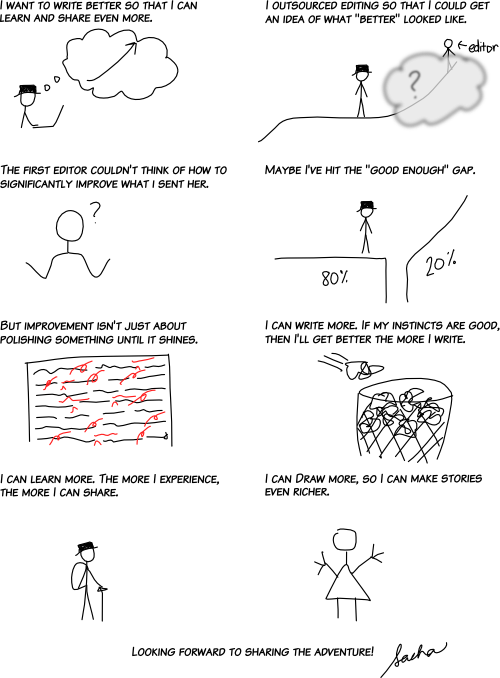A perspective on outsourcing
Posted: - Modified: | delegationMel suggested that I write about delegation and outsourcing to virtual assistants because I approach it in a different way. I’ve read many of the same blog posts and books that she must have read, mostly written by entrepreneurs trying to squeeze as much value out of their time as possible and who want to eliminate pesky necessities like housekeeping or cooking.
I happen to like cooking. I get intrinsic value from many of the activities that people typically outsource: cooking, gardening, writing blog posts, responding to e-mail, developing websites… I also don’t mind living a small-scale life, a life where there’s room to breathe. I don’t have to do it all or have it all.
What are my reasons for delegating, then?
I want to learn how to give instructions and let go of tasks, because the feeling that I need to do everything myself will be a bottleneck if I allow it to be.
I want to get things done better than I can do them myself, taking advantage of skills that take people years to develop and experiences that I will never have.
I want to work around the limits of my attention. Sometimes I shelve projects or procrastinate tasks. Paying someone to do things not only gets those things done, it also strengthens my own commitment to move things forward.
Part of this motivation to learn how to outsource things comes from more deliberate choices about what I want to focus on and more awareness of what tends to fall to the bottom of my to-do list. In my sketchbook, there’s a page divided in two: things to say yes to and things to say no to. For example, I accept that I’m not going to invest the time into drawing realistic figures or painting work as beautiful as the ones I see hanging in the art galleries (“no” pile), and I’m going to focus instead on simple, quick drawings that capture ideas (“yes” pile).
Deciding not to try to do it all – picking some things I’m going to focus on, at least for the next year – makes it easier to choose tasks to outsource. If I want something done but I’ve chosen not to budget the time to learn how to do it well, then the real question is whether I want it strongly enough to pay someone to do it this year or whether it’s something I can postpone until I reevaluate my learning priorities. Here are the reasons why I might delegate something:
- Time premium: Is there value to having it done earlier than I can make the time to do it or learn the skills I need in order to do it?
- Skills: Can other people do it much better than I can?
- Relative advantage: Can other people complete it in less time or for less cost than I might?
- Energy: Is this something that energizes other people much more than it energizes me?
- Interruption / task switching: Can delegating this free up my attention so that I can focus on larger chunks?
- Opportunity cost: Would I be able to earn more or enjoy a different activity much more if I spent time doing that instead of this?
- Documentation and repetition: Is this a repeatable process? Is it worth investing the time in documenting the process and debugging the instructions?
- Learning: What can I learn from delegating this?
Here’s a short list of activities I’ve been thinking of delegating:
- Reminders
- Appointments
- Data entry
- Typing in text from scans (receipts, evaluations, business cards, etc.) or sketchnotes
- Contact information
- Comparison-shopping
- Transforming text
- Web research
- Text formatting
- Transcription
- Data collection and analysis
- Proofreading and editing
- Illustration
- Graphic design
- Web development
- Web design
- Turning sketches into mockups or HTML/CSS templates
- HTML5/Javascript development
- Rails development
- Setting up get-togethers with friends
I’m also interested in local assistance for:
- Occasional batch cooking, so we can try different recipes and enjoy more variety
- Cleaning
- Other chores and errands
I’ll gradually work up to delegating different activities. Gotta work on my comfort level and ability to give instructions, after all! =)

